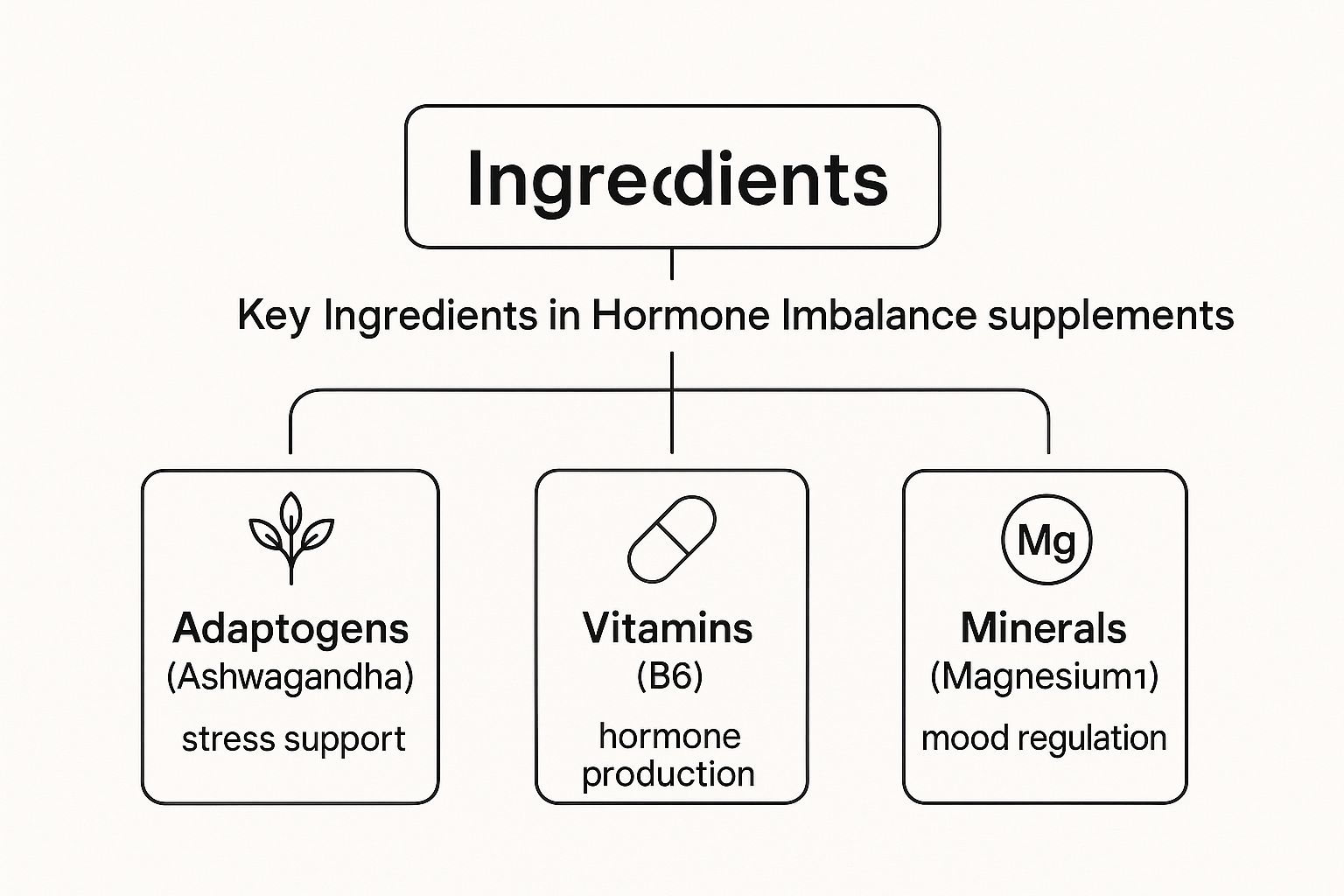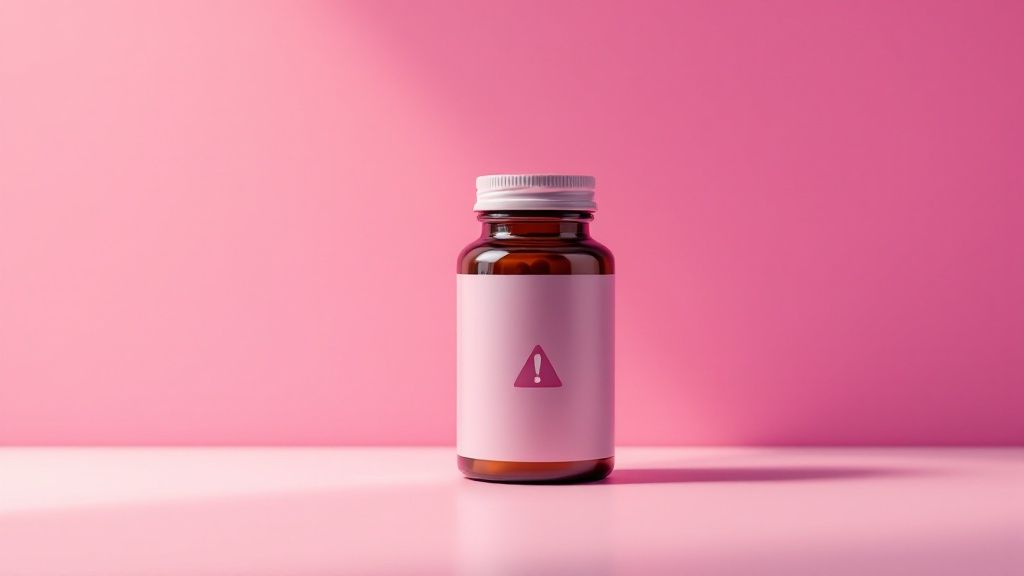
Your Guide to Hormone Imbalance Supplements
Share
A hormone imbalance supplement is a product designed to support your body’s natural hormone production and regulation, using targeted nutrients and botanical extracts. Think of it as giving your system the essential raw materials—like specific vitamins, minerals, and adaptogens—that your endocrine system needs to keep everything in its delicate balance. They can help with everything from stress and fatigue to mood swings and poor sleep.
What Is Hormonal Imbalance Really?

Imagine your body’s hormones are a finely tuned orchestra. When every instrument plays in perfect harmony, you feel fantastic—energetic, clear-headed, and emotionally steady. But if one section, say the brass, starts playing out of tune, the whole symphony sounds off. That’s the essence of a hormonal imbalance.
It’s not just a technical medical term; it’s often the real reason behind many persistent and frustrating symptoms. That unexplained fatigue, the sudden mood swings, poor sleep, or stubborn weight that just won't shift? Those can all be signals that your internal orchestra is off-key. A good hormone imbalance supplement can act like a tuning fork, gently guiding your body back toward its natural rhythm.
The Key Players in Your Hormonal Orchestra
To understand what’s gone wrong, we need to meet the lead musicians. While your body produces over 50 different hormones, a few key players have an outsized impact on how you feel from one day to the next.
- Cortisol: Often dubbed the "stress hormone," cortisol is the orchestra's conductor. When you face a threat, it directs your body's entire stress response. In short bursts, this is incredibly useful. But chronic stress keeps the conductor on high alert, leading to elevated cortisol that can wreck your sleep, ramp up anxiety, and throw other hormones completely out of whack.
- Oestrogen and Progesterone: These are the primary female sex hormones, responsible for regulating the menstrual cycle, mood, and so much more. The balance between them is crucial. When it shifts—due to stress, age, or lifestyle—it can lead to symptoms like PMS, irregular cycles, or challenges during perimenopause and menopause.
- Testosterone: While it's known as the main male sex hormone, testosterone is also vital for women, influencing energy, muscle mass, and libido. When levels are too low or too high, it can impact everything from your mood to your body composition.
These hormones never work in isolation. They’re constantly communicating, creating a delicate feedback loop. For instance, high cortisol from chronic stress can suppress progesterone production, leading to an imbalance with oestrogen. This interconnectedness is why a problem in one area can create a ripple effect across your entire system.
Hormonal imbalance isn't a single event but a chain reaction. Chronic stress can elevate cortisol, which may suppress reproductive hormones, leading to a cascade of symptoms that affect mood, energy, and overall wellbeing.
How Modern Life Knocks Things Off-Key
Our bodies are brilliant at handling short-term stressors, but modern life often presents a constant, low-grade stream of them. Poor sleep, processed foods, not enough sunlight, and the relentless ping of notifications all contribute to a state of chronic stress.
This constant pressure forces your adrenal glands to work overtime churning out cortisol, which can lead to what's often called adrenal fatigue. Think of it like constantly revving a car's engine in first gear—eventually, it wears out. When your adrenal system is fatigued, your body struggles to regulate everything from blood sugar to inflammation, making hormonal balance even harder to achieve. A well-formulated hormone imbalance supplement aims to give your body the nutritional support it needs to better cope with these modern pressures and restore its internal harmony.
How Supplements Can Support Your Hormonal Health

So, how can a hormone imbalance supplement actually help get your body's complex orchestra playing in tune? It’s not about forcing an aggressive change or flooding your system with synthetic hormones. It’s much smarter than that. The goal is to give your body the precise tools it needs to regulate itself more effectively.
Imagine your endocrine system is a highly skilled production line, responsible for manufacturing hormones like oestrogen, testosterone, and thyroid hormones. To do its job, it needs specific building blocks – things like vitamins, minerals, and healthy fats. If these raw materials run low, the whole production line grinds to a halt, leading to deficiencies and imbalances.
Supplements step in to fill these nutritional gaps. They provide the essential cofactors your body is crying out for to build hormones, process them correctly, and make sure they can deliver their messages clearly to cells all over your body.
Providing the Essential Raw Materials
Your body can't just create hormones out of thin air. It needs a steady supply of specific nutrients to keep that production line running without a hitch, and this is where a well-formulated supplement can offer foundational support.
For instance, cholesterol is the starting point for all steroid hormones, including cortisol, oestrogen, and testosterone. Healthy fats like omega-3s are not only crucial for making hormones but also for building healthy cell membranes that can actually receive hormonal signals.
Vitamins and minerals are like the factory workers on this assembly line. They’re absolutely vital for converting one compound into another, making sure the final hormone is crafted efficiently.
- B Vitamins: Think of these as the power source for your adrenal glands, which produce stress hormones. Without enough B vitamins, your ability to handle stress can seriously falter.
- Magnesium: This calming mineral is a true multi-tasker, involved in over 300 different processes in the body. Many of these are directly linked to hormone regulation and neurotransmitter function, which has a huge impact on your mood and sleep.
- Vitamin D: Often called the "sunshine vitamin," it actually functions more like a hormone itself. It plays a critical role in regulating insulin and supporting your thyroid.
By ensuring your body has a reliable stock of these key players, a hormone imbalance supplement helps your system get back to doing what it does best, without struggling for resources.
Think of it like baking a cake. If you don't have enough flour (vitamins) or eggs (minerals), the cake just won't turn out right, no matter how good the recipe is. Supplements provide those essential ingredients for your body's hormonal recipe.
Calming the Stress Response with Adaptogens
One of the biggest culprits behind hormonal chaos is chronic stress. When your cortisol levels are constantly elevated, they can suppress the production of other key hormones, triggering a domino effect of imbalances. This is where a unique class of herbs known as adaptogens really shines.
Adaptogens, such as ashwagandha, don't just crudely boost or suppress hormones. Instead, they help your body adapt to stress, gently nudging physiological processes back toward a state of balance. If your adrenal glands are working overtime and pumping out too much cortisol, ashwagandha can help them find a more sustainable rhythm. It does this by modulating the hypothalamic-pituitary-adrenal (HPA) axis—your body's central stress response system.
This clever action helps prevent cortisol from drowning out all the other hormonal conversations happening in your body, allowing a more natural rhythm to be restored. By supporting your stress response, adaptogens get to the heart of many modern hormonal issues, helping you move from feeling constantly frazzled to a state of calm resilience.
Powerful Ingredients to Look For
Walking down the supplement aisle can feel pretty overwhelming, right? With a sea of bottles all promising incredible results, it's tough to know what actually works. When it comes to a hormone imbalance supplement, the secret is to look for well-researched ingredients that get to the root of the problem, whether that's stress, inflammation, or simple nutritional gaps.
Let's break down the all-stars of hormonal support. We'll go through the most powerful, science-backed ingredients and explain exactly how they help bring your body back into alignment. Once you know what to look for, you can read those labels with confidence and choose a formula that’s truly going to help.
This diagram gives a great overview of how different ingredients can work together, supporting your body's hormonal systems from multiple angles.

As you can see, a really effective formula is all about synergy. It combines things like adaptogens for stress, minerals for regulation, and vitamins for hormone production to create a powerful, combined effect.
Adaptogens: The Stress Modulators
If there’s one category of ingredients that’s a game-changer for hormonal health, it’s adaptogens. These are clever botanicals that help your body build resilience against the hits of physical and emotional stress.
Instead of shoving your hormones in one direction, adaptogens work by gently guiding your body’s stress response system—primarily the HPA axis (hypothalamic-pituitary-adrenal axis). They help your body find its own equilibrium, or homeostasis.
Ashwagandha (Withania somnifera)
This ancient Ayurvedic herb is probably the most famous adaptogen for a reason. It's brilliant at helping to lower cortisol, your body's main stress hormone.
When cortisol is constantly high, it can throw everything off—disrupting sleep, ramping up anxiety, and even suppressing your reproductive hormones. By helping to keep cortisol in check, ashwagandha promotes a much calmer, more balanced state. If you feel like stress is getting the better of you, you can find more information about our Ashwagandha supplement here.
Foundational Minerals for Hormone Pathways
Minerals are the unsung heroes of hormonal health. Think of them as essential cofactors—the "helper molecules" needed for hundreds of reactions in your body, including the ones that build and regulate your hormones.
Magnesium
Often called the "calming mineral," magnesium is absolutely vital for regulating the nervous system and is involved in over 300 different biochemical reactions. It helps manage the HPA axis, which can lead to lower cortisol and a better response to stress.
Magnesium also has a hand in producing serotonin, the neurotransmitter that governs your mood, and melatonin, the hormone that controls your sleep-wake cycle. Since both mood and sleep are so tightly linked to hormonal balance, getting enough magnesium is non-negotiable.
Zinc
This mighty mineral is crucial for thyroid function, as it helps convert the inactive thyroid hormone (T4) into its active form (T3). It also supports healthy ovulation and is needed to produce testosterone. A zinc deficiency can ripple out and contribute to a whole host of hormonal issues.
Think of minerals as the spark plugs in your body's hormonal engine. Without them, the entire system can misfire, even if you have enough fuel. A high-quality hormone imbalance supplement will always include bioavailable forms of these key minerals.
Essential Vitamins and Fats
Vitamins and healthy fats are the raw materials your body needs to actually create hormones and maintain healthy communication between cells. If you're running low in these key areas, the entire hormonal production line can grind to a halt.
Below is a quick guide to some of the most important ingredients you'll find in quality hormone support supplements, explaining what they do and the kinds of symptoms they help manage.
Key Ingredients in Hormone Support Supplements
| Ingredient | Primary Hormonal Function | Helps With Symptoms Like |
|---|---|---|
| Ashwagandha | Modulates the stress response (HPA axis), reduces cortisol. | Stress, anxiety, poor sleep, fatigue. |
| Magnesium | Regulates the HPA axis, co-factor in hormone production. | Mood swings, insomnia, anxiety, muscle tension. |
| Zinc | Supports thyroid hormone conversion and testosterone production. | Low energy, irregular cycles, low libido. |
| B-Complex Vitamins | Co-factors in neurotransmitter production and hormone metabolism. | Low mood, PMS, fatigue, brain fog. |
| Vitamin D | Acts as a hormone itself, regulating insulin and immune function. | Mood issues, weakened immunity, poor insulin sensitivity. |
| Omega-3s | Builds healthy cell membranes and reduces inflammation. | Inflammation, poor cell communication, mood swings. |
This table shows why a well-rounded formula is so important. Each ingredient plays a specific role, but they all work together to support your body's complex hormonal network.
- B-Complex Vitamins: These vitamins, particularly B6, are critical for producing mood-regulating neurotransmitters like serotonin and dopamine. They also support your liver, which is essential for breaking down and clearing out excess hormones.
- Vitamin D: Often called the "sunshine vitamin," Vitamin D actually functions more like a hormone in the body. It plays a big part in regulating insulin, supporting immune function, and maintaining overall hormonal harmony.
- Omega-3 Fatty Acids: These healthy fats form the foundation of healthy cell membranes. This is crucial for making sure hormonal messages can be properly received by your cells. On top of that, omega-3s are powerful anti-inflammatories, helping to cool down the systemic inflammation that can seriously disrupt your hormonal communication.
The growing understanding of these benefits is clear from market trends. The UK dietary supplements market was valued at about £3.77 billion in 2024 and is projected to hit £7.60 billion by 2033, with vitamins taking the largest share of revenue. This shows a huge shift towards using targeted nutrition, like that found in a high-quality hormone imbalance supplement, to proactively manage health. Learn more about UK supplement market trends from Grand View Research.
Hormone Needs for Men and Women
When it comes to hormonal health, there's absolutely no one-size-fits-all solution. The biological rhythms and challenges men and women face are worlds apart, which means the support they need from a hormone imbalance supplement should be just as unique.
Let's be clear: what helps a woman navigate menopause simply won't be what a man needs to maintain his vitality. Getting to grips with these gender-specific needs is the first crucial step toward finding something that genuinely works. So, let’s dive into the distinct hormonal journeys of men and women and see how targeted support can make all the difference.
Supporting Women Through Every Life Stage
For women, the hormonal landscape is in constant flux, shifting with monthly cycles and across major life stages. From puberty right through to post-menopause, the delicate dance between oestrogen and progesterone directs everything from mood and energy levels to how clear our skin is.
During the reproductive years, many women are all too familiar with premenstrual syndrome (PMS), where symptoms like mood swings, bloating, and fatigue are driven by those monthly hormonal tides. Then, as they head into their late 30s and 40s, the perimenopause transition kicks in, often bringing a fresh set of challenges like irregular cycles and sleep issues as hormone production begins to wind down.
Menopause itself signals a massive hormonal shift, as falling oestrogen levels can trigger a cascade of well-known symptoms.
- Hot Flashes and Night Sweats: Those sudden, intense waves of heat can be disruptive during the day and can completely wreck a good night's sleep.
- Sleep Disruption: It's not just the night sweats. Changes in progesterone and oestrogen can directly interfere with the body's natural sleep-wake cycle.
- Mood Changes: Shifting hormones can mess with neurotransmitters in the brain, sometimes leading to feelings of anxiety or a persistently low mood.
This is where a well-formulated hormone imbalance supplement can offer real, targeted relief, providing botanicals and minerals that help the body adapt to this natural transition. The demand is surging, too. In the UK, the menopause market, including supplements, generated around £386.1 million in 2024 and is expected to hit £510.6 million by 2030. This isn't just a trend; it shows a strong and growing reliance on supplements to manage these symptoms.
For many women, navigating menopause feels like trying to read a map in a foreign language. The right supplement acts as a translator, helping the body understand and adapt to its new hormonal reality, easing symptoms like hot flashes and sleep disruption.
Addressing Key Hormonal Concerns for Men
While men don't go through the same monthly hormonal cycles as women, their hormonal health is every bit as critical to their overall wellbeing. For men, the conversation usually centres on maintaining healthy levels of testosterone—the key hormone for vitality, muscle mass, and drive.
After the age of 30, testosterone levels naturally start to decline by about 1-2% each year. This is a normal part of ageing, but things like chronic stress, poor sleep, and a lacklustre diet can speed up the process, leading to symptoms you can really feel.
The main concerns for men often boil down to:
- Maintaining Healthy Testosterone: Low testosterone can manifest as fatigue, a dip in libido, difficulty building muscle, and a general feeling of having lost your edge.
- Managing Cortisol and Stress: Just like in women, chronic stress sends cortisol levels soaring, which can put the brakes on testosterone production. A man who feels constantly drained and run-down might be feeling the direct hormonal impact of stress.
- Sustaining Energy and Focus: Getting the hormonal balance right is absolutely essential for staying mentally sharp, motivated, and physically capable throughout a busy day.
For men, a hormone imbalance supplement will typically focus on ingredients that support the body's own testosterone production and help manage the stress response. You can explore our detailed guide on how to boost testosterone naturally. By providing key nutrients like zinc and magnesium, alongside adaptogens such as ashwagandha, these supplements can help men fight back against stress-induced fatigue and maintain their peak performance, both physically and mentally.
How to Choose a High-Quality Supplement

With what feels like a million options on the shelf, picking a hormone imbalance supplement that’s both safe and actually works can feel a bit overwhelming. But it doesn't have to be.
The good news is that once you know what to look for, you can quickly learn to spot the quality products and sidestep the ones that are all marketing fluff. It really just comes down to decoding labels, recognising a few key red flags, and understanding why a chat with a professional is so important.
Think of this as your practical checklist to confidently choose a supplement that fits your personal health needs, ensuring your investment in your wellbeing is a smart one.
Decode the Supplement Label
The back of the bottle tells the real story. Don't get distracted by the flashy promises on the front; flip it over and get down to the details that separate the genuinely good formulas from the rest.
- Clinically Relevant Dosages: A top-tier supplement will list its ingredients in amounts that have been proven effective in scientific studies. If a product boasts about having ashwagandha but only includes a tiny sprinkle, you're unlikely to feel the benefits.
- Bioavailable Forms: Your body can't use what it can't absorb. Look for minerals in their "chelated" forms (like magnesium glycinate) and vitamins in their active forms (like methylcobalamin for B12). These are far easier for your body to absorb and put to good use.
- Third-Party Testing: The best brands voluntarily send their products to independent labs for testing. This confirms that what's on the label is actually in the bottle and that it’s free from nasty contaminants like heavy metals or microbes. Keep an eye out for certifications from organisations like NSF or USP.
A supplement label is a bit like a recipe. A quality one lists every ingredient with precise measurements. A poor one might just say "a blend of spices," leaving you to guess what’s really inside.
Spot the Red Flags
Knowing what to look for is only half the battle; you also need to know what to avoid. A few common practices in the supplement world should immediately make you pause.
Proprietary Blends
This is one of the biggest red flags out there. A "proprietary blend" lumps a group of ingredients together under one name with a total weight, but it cleverly hides the exact amount of each one. This makes it impossible to know if you're getting an effective dose of the important stuff or just a lot of cheap filler.
Exaggerated Marketing Claims
Be sceptical of any hormone imbalance supplement promising instant fixes or "miracle" cures. Restoring hormonal balance is a gradual process. Supplements are there to support your body's natural systems, not perform magic tricks. Trustworthy brands stick to realistic, science-backed information. For more on what makes a solid daily supplement, have a look at our complete multivitamin guide for women.
Always Consult a Healthcare Professional
This is the final, non-negotiable step. Before you start taking any new supplement, it's absolutely essential to speak with a qualified health professional, especially if you have any existing health conditions or are on other medications.
A doctor or registered dietitian can help figure out your specific needs, perhaps even recommending tests to pinpoint any deficiencies. They’ll ensure the supplement you're considering is genuinely safe and right for you. This is more relevant than ever, with nutritional gaps being so common. For instance, nearly half of UK adults have less-than-ideal vitamin D levels, a deficiency often tied to hormone issues.
Got Questions About Hormone Supplements?
Deciding to try a hormone imbalance supplement is a brilliant first step, but it’s totally normal to have a few questions swirling around your head. Getting to grips with the practical side of things—like what to expect and how to take them safely—is key to feeling confident and in control.
So, let’s tackle some of the most common queries head-on with clear, straightforward advice.
How Long Until I Notice a Difference?
This is usually the first thing people ask, and the honest answer is: it really depends. Unlike a painkiller that gets to work in an hour, hormone supplements support your body’s complex systems in a much gentler way. The process of finding that balance again is gradual.
Think of it like watering a thirsty plant. You won't see it perk up the second the water hits the soil. But with consistent care over days and weeks, you’ll start to see it regain its vibrancy. In the same way, supplements need time to build up in your system and give your body the nutritional backup it needs to start rebalancing itself.
For some, subtle shifts in energy or mood might pop up within a few weeks. For others, it could take two to three months of consistent use to really feel a difference in things like sleep quality or how you handle stress. The magic ingredient here is consistency. Taking your supplement every single day is what gets results.
Patience and consistency are your best friends here. Hormonal balance is a journey, not a sprint, and your body needs time to respond to the support you’re giving it.
Can I Take These with My Medications?
This is a super important question, and the answer is a firm maybe—but you absolutely must ask your doctor first. Even completely natural ingredients can interact with prescription medications in ways you wouldn't expect.
For example, certain herbs can change how your body processes other drugs, which might make them less effective or even ramp up the risk of side effects. Ashwagandha, for instance, might not play well with thyroid medications, while other ingredients could affect blood thinners or antidepressants.
Your doctor or a qualified pharmacist is the only person who can give you a safe answer. They can look at your current meds and health history to spot any potential clashes and give you the all-clear. Never, ever start a new supplement without having this chat first.
What Are the Potential Side Effects?
Most high-quality hormone supplements are made with well-tolerated ingredients, so side effects are generally mild, if they happen at all. When people do experience them, it's often just minor digestive grumbles as their body gets used to something new.
Of course, every body is different. A really sensible approach is to start low and go slow. Begin with the smallest recommended dose to see how you get on. This gives your system time to adapt and lowers the chance of any unwanted effects. If you feel fine after a week or two, you can think about moving up to the full recommended dose.
Here are a few things to keep in mind:
- Listen to your body: If you notice any discomfort that hangs around, stop taking the supplement and have a word with your healthcare provider.
- Don't exceed the dose: More isn't better! Stick to what it says on the label unless your doctor has told you otherwise.
- Check for allergens: Always give the full ingredient list a once-over to make sure you’re not sensitive to anything, including fillers or binders.
By following these simple steps, you can safely bring a hormone imbalance supplement into your daily routine and give your body the support it needs to find its rhythm again.
This article is for informational purposes only and is not medical advice. Always consult a qualified health professional before starting any new supplement or major lifestyle change.
